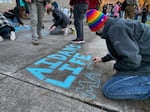On Nov. 23, Aidan Ellison — a Black teenager — was shot and killed in Ashland, Ore. A white man stands accused of the killing. This small college town near the Oregon-California border has a progressive reputation, but Ellison’s death has led many community leaders to question that reputation and demand change.
They gathered along with a couple of hundred other people for a vigil Wednesday night at the Jackson County Courthouse. Organizers chose this location to send a message to the district attorney handling the shooting: There needs to be justice.
“The tragedy is horrific, and it happens too often,” says Aisha Wand, a Black resident who has lived here for more than 20 years. “It’s hard for me to talk about. I have a 16-year-old boy, and I worry about him as well. Being out at night, being out with his friends, because of instances like this happening.”

Community leaders organized a vigil at the Jackson County Courthouse in Medford on Wednesday, Dec. 2, for Aidan Ellison.
Erik Neumann
Nineteen-year-old Ellison had been playing music in a hotel parking lot around 4 a.m. when 47-year-old Robert Keegan allegedly asked him to turn it down. They were both guests at the hotel. According to court records, the two had an argument, then Keegan is accused of going back to his room and returning with a gun. Police allege he then fatally shot Ellison in the chest.
Keegan now faces several charges, including second-degree murder. The FBI says it’s investigating whether federal laws on bias were violated in this shooting.
Both Ellison and Keegan had been living at the hotel. Ellison recently lost his job at a Burger King that burned down in a wildfire this summer, and Keegan’s house was among the 2,400 homes that were destroyed by the same fire.
Much of this region is predominately white; According to census data, about 80% of the population in Jackson County identifies solely as white. Less than 2% are Black or Black and another race.
A handful of racial equity groups have formed in the county since George Floyd was killed by police in Minneapolis in May. Those groups have organized events to educate people about racism in Southern Oregon, including Black Lives Matter marches that brought hundreds of people to Medford’s streets and a demonstration in the small town of Rogue River, where counter-protesters came heavily armed.
Many community leaders say it’s clear that there’s more work to be done to address systemic racism in this region.
They include Kayla Wade, who founded the Southern Oregon Coalition for Racial Equity. Wade helped organize Ellison’s vigil.
“We’re here because a white man thought that a young Black kid just expressing himself and listening to music and decompressing was unacceptable and needed to be dealt with,” Wade said to the crowd on the courthouse steps. “And we’re here because every person of color, every Black person in this community, has experienced something like that: having a white person decide that how we’re living our lives is unacceptable and that we need to tone it down or need to be silenced. If we want to live in a world where we can exist with dignity, something has to change.”

Toren McKnight of Central Point draws on the cement at the vigil for Aiden Ellison outside the Jackson County Justice Building in Medford, Ore., on Wednesday, Dec. 2.
Erik Neumann
Ellison moved to Ashland with his siblings and his mother, Andrea Wofford, several years ago.
“We came out here from California for a camping trip and fell in love with the mountains, the greenery,” Wofford recalls.
When Wofford had to move to another city a few hours away, Ellison chose to stay behind to be with his friends, even if that meant living without a fixed address.
Wofford says her son had an infectious smile. He would wear himself thin trying to make everyone around him happy, and he loved music. She gets emotional recalling how much he struggled being one of the few Black people living in Ashland.
“There are two rules here: Smile and be whitewashed,” Wofford says. “Because you can’t dance. You can’t have your music. You have to talk a certain way because no one understands what you’re saying and you have to re-create your whole self. And it angered him, it angered him so much, that he could not be who he was but everybody else could. And if you don’t submit here, you’re a problem. You’re a problem.”
Wofford says the death of her son Aidan Ellison is a loss for this world, but a gain for Heaven — where she says he is free to be Black now.